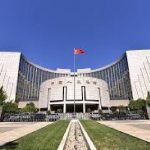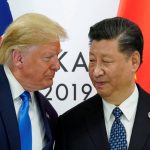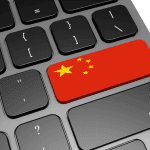The US plans to require American companies to disclose investments they make in China in high-tech sectors such as artificial intelligence, and to prohibit certain investments outright.
The much anticipated move gives the government new power to screen foreign dealings by private companies.
The US said the measure would be narrowly targeted, but it is poised to further chill economic relations between the two superpowers.
China has called the plans “arbitrary”.
The order by US President Biden formally kicks off the push to craft rules to bar American businesses from investing in firms from “countries of concern” that are active in quantum computing, advanced semiconductors and certain areas of artificial intelligence.
The government will also require US firms to notify the Treasury Department of investments in firms working on a wider range of artificial intelligence and semiconductor technology.
The rules are not expected to apply to so-called portfolio investments, in which firms invest passively in companies via the stock market, but are focused on active investments made by private equity, venture capital and other firms.
They will now enter a public comment period, which is expected to further clarify what kinds of investments are off-limits. The rules are not expected to go into effect for months.
In a briefing with reporters, senior administration officials said the measure was a “national security action, not an economic one”. They said the US remained committed to open investment.
Sarah Bauerle Danzman, a senior fellow at the Atlantic Council, said the approach outlined on Wednesday was narrower than some of the other proposals under debate, but still represented an “unprecedented” expansion of government oversight.
Controls on outbound investment are rare among advanced economies, currently present only in Japan and Korea, according to a 2022 report by the US-China Investment project.
In the US, prior restrictions on China trade have relied on limiting sales of sensitive technology by US firms and screening Chinese investments in American companies. The Trump administration has also barred investments in firms tied to China’s military.
The latest measure has widespread support in Washington, where it is seen as fixing a regulatory gap concerning financial flows that risks allowing American money and know-how to to flow into China and assist its military ambitions.
The US has been trying to build international support for the investment curbs with some signs of success.
Prime Minister Rishi Sunak in May said the government would consider curbs on outbound investment; the European Commission put forward a proposal focused on investments in sensitive technologies earlier this summer.
It is not clear how significantly the order would affect flows of investment.
China was the number two destination for foreign investment in 2022, behind the US, but many reports suggest money flowing into the country from the US and elsewhere has dropped sharply as geopolitical relations sour.
In the UK, a recent survey by the Institute of Directors found that one in five UK importers had already switched investments away from the country due to geopolitical tensions.
China has also responded with its own rules, including limits on exports of some critical minerals used to make computer chips.
Treasury Secretary Janet Yellen, who visited China in July to try to ease tensions, said last month she did not think the coming curbs would have a fundamental impact on the investment climate in the country.
But Ms Bauerle Danzman, a professor of international studies at Indiana University, said despite US efforts to target its restrictions, the ill-defined nature of some of the technologies in question, many of which also have consumer uses, means the clampdown risks becoming too broad.
She warned that could ultimately hurt the US, by raising costs for businesses and isolating the country from technological advances.














